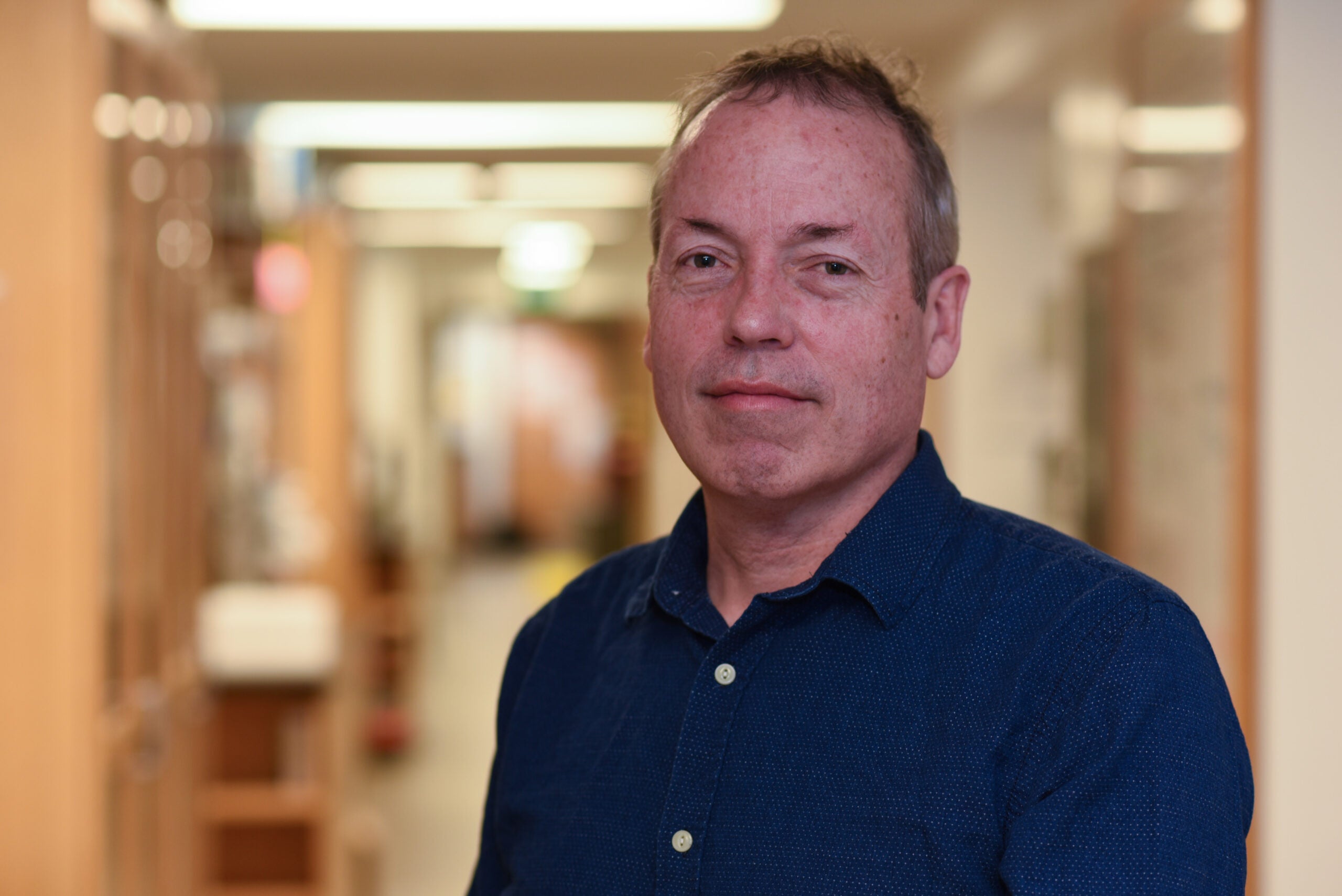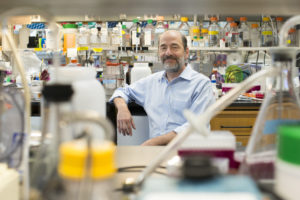By Diana Crow

HMS Neurobiology professor David Ginty is succeeding Harvard Brain Science Initiative (HBI) founder Michael Greenberg as chair of the Department of Neurobiology and as co-director of HBI.
Ginty’s duties as co-director include spearheading a vision of neuroscience at Harvard that captures the University’s incredible ecosystem of multidisciplinary scholars.
For Ginty, reaching out to the local community and facilitating interactions between scientists and scholars are key priorities for his tenure as HBI co-director. “There are hundreds of labs across the university and the affiliates that do neuroscience or neuroscience-related work,” Ginty said. “It’s an opportunity to bring us together as a community. That’s first and foremost.”
HBI works to connect neuroscientists across the community through focused working groups, symposia, competitive grant programs, engagement with industry, and trainee development. Ginty and FAS Professor Venkatesh Murthy will lead efforts to raise funds for these endeavors and to catalyze the growth of Harvard neuroscience.

Venki Murthy in his lab. Photo by Anna Olivella.
“We want to go beyond the neurosciences and engage the community more generally,” he added. “We’re talking about ways of engaging engineering [and] the other departments in Cambridge that aren’t typically thought of as neuroscience departments but have related interests.” These outreach projects could take the form of networking events or art exhibits that explore the intersections between neuroscience, perception, and cognition.
Murthy, who is also a co-director of HBI, is looking forward to collaborating with Ginty. “I am over the moon about David becoming co-director of HBI. David is a fantastic scientist with a buzzing research program, so we are fortunate to have him take the time to help with HBI! There’s no doubt he will bring his customary thoughtfulness, intelligence and creativity to HBI.’’
Celebrating a Mentor
Greenberg, who has been co-director of HBI since its founding in 2013 salutes Ginty as his successor. “I am thrilled that David is taking on a leadership role as a new co-director of HBI,” Greenberg said. “David is a wonderful scientist and human being. He is the perfect person to take HBI to the next level.”
“As I step down I want to publicly thank Josh [Sanes] and Venki for being great HBI co-directors, Parizad [Bilimoria] and her team [Adam Zajac and Celia Muto] for their dedication to making HBI what it is, Kathy Buckley for helping launch and guide HBI in its early years, Provost Alan Garber for steadfast financial support of HBI, the steering committee for their many creative ideas, and all the Harvard neuroscientists who make HBI great,” he added.
Ginty and Murthy both expressed their appreciation for Greenberg’s efforts establishing and leading HBI.
“Mike has been a remarkably effective leader,” Ginty said. “He has a tremendous capacity for interacting with many people and leading a large department, while at the same time heading an incredibly productive lab, so he’s a real role model for someone who can balance leadership roles and running a science laboratory.”

Mike Greenberg in his lab. Photo by Anna Olivella
In addition to his role as Chair of the Department of Neurobiology, Greenberg launched HBI with FAS Neuroscience Professor Josh Sanes in 2013 in recognition of the fact that neuroscience can best propel forward via collaboration and partnerships across labs. “It’s a positive atmosphere that really fosters great science,” Ginty said. “It enables the recruitment of top talent. And it’s a tremendous training environment, and I think that’s largely a testament to the leadership that we’ve had for the last fifteen years!”
“It has been wonderful working with Mike,” Murthy agreed. “When I started as co-Director, HBI was already flourishing thanks to the efforts of Mike and the previous co-director Josh Sanes. Mike is a true community builder, and that outlook undergirded every decision he made at HBI. He also had a wonderful light touch, trusting the staff and colleagues in HBI to make independent decisions. He made people feel empowered.”
Murthy added, “I want to take this opportunity to extend my personal thanks to Mike for all that he has done (and continues to do) for HBI and the neuroscience community at Harvard.”
“A Privilege to Be a Scientist”
Originally hailing from Fairfield, Connecticut, Ginty didn’t intend to become a scientist when he was young. Instead, he was interested in sports and exploring the outdoors. Most of his high school friends and classmates had no plans to attend college. “College wasn’t even on my radar,” Ginty recalled. “No one I knew went to college.”
Since math and science were his strong suits in high school, Ginty focused on them as an undergraduate at Mount Saint Mary’s College. Physiology was his favorite class, and the physiological properties of neurons fascinated him, as did the process of scientific inquiry. He continued on to graduate school at Eastern Carolina University, where he would study energy metabolism and signaling in neurons and epithelial cells.
“I felt this way then, and I feel this way now: I couldn’t believe I got paid to do the kind of work I was doing,” Ginty said. “It was so interesting and so much fun, especially when I learned something that had never been known before. That was a rush. And I loved doing experiments with my hands and figuring out how to ask questions and how to get answers…It’s just a privilege to be a scientist; I always have felt that.”
In graduate school and as a postdoc, Ginty and his colleagues studied how growth factors affect the development of cells including peripheral neurons. At the time, electrophysiological recordings were neuroscientists’ primary tool for studying these neurons, but it was clear that there were more facets to discover. “We realized around that time that we were looking at the development of sensory neurons and didn’t know who they became or what their functions were in the adult nervous system,” Ginty said. Exploring the functions of mature sensory neuron subtypes became the focus of Ginty’s scientific work.
Ginty joined the faculty at Johns Hopkins University in 1995. As modern sequencing technology became available in the 1990s and 2000s, Ginty and his colleagues identified many distinct types of sensory neurons by their unique patterns of gene expression. These neuronal types include nerves that specialize in light touch, some that respond to certain vibrations, others that only detect heat alongside those that only detect cold, and more. Taken together, studies by Ginty and his colleagues show that what many call the “sense of touch” is an amalgam of many different sensory modalities.
“What’s become really exciting over the last several years, because of new molecular and genetic strategies, we now have tools to study each one of these neurons in isolation,” Ginty said. “So we can study in great detail the neuron, for example, that responds to high-frequency vibrations of the skin and understand what allows it to respond the way it does and how it connects to the brain and spinal cord. We can study the anatomy of the neuron, what its endings look like in the skin, what its central projections into spinal cord and brain stem look like, and together how all of these properties ultimately impinge on that neuron’s function.” Taken as a whole, Ginty’s work aims to solve how the diversity of touch experiences is ultimately the ensemble of the many unique properties of sensory neurons.
Ginty returned to Harvard as a faculty member in 2013 and soon joined the nascent HBI as a member of the faculty steering committee.
What’s Ahead
Today, Ginty’s lab is looking into the neural circuits that underpin the sense of touch and why light touch might become painful or aversive in some cases. “It’s a remarkable time to be a neuroscientist because of the tremendous convergence of technologies and approaches,” he said. “Think of the stunning advances in genetics, physiology, computational neuroscience, and more; these are now coming together to propel the field to new heights. I think the next few decades are going to be incredibly exciting because of the advances and technologies that allow us to ask questions that we wouldn’t even have dreamed of 10 years ago.”
He added, “I think the Department of Neurobiology and HBI are poised to make a major impact, because these are platforms through which we can bring people with different expertises together to really synergize and advance the science in a way that would not be possible otherwise.”
The labs of HBI run the gamut of neuroscience, from perception and cognition, to sensory processing to learning and memory. Ginty hopes to leverage these diverse but overlapping interests to build an even more vibrant neuroscience community in and around Boston.
“HBI has increasingly served its purpose to knit the neuroscience community together at all levels,” said Greenberg. “This is due to the efforts of Parizad and her amazing team and also the fantastic HBI steering committee. I would like to see HBI continue on its steady course and perhaps evolve through imaginative ideas of the Harvard neuroscientists and in particular the two new co-directors Venki Murthy and David Ginty.”
News Types: In the News
